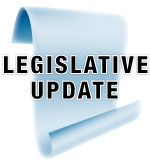 The Assembly Education Committee approved several bills in its Feb. 8 meeting.
The Assembly Education Committee approved several bills in its Feb. 8 meeting.
Kindergarten A-1016 establishes a task force, which includes a representative from the New Jersey School Boards Association, to study issues related to the establishment of full-day kindergarten. NJSBA supported this bill.
Reinstitute School Nurse Certification Requirements A bill, A-1256 that would require State Board of Education regulations regarding school nurse certification to include certain minimum eligibility requirements passed the committee vote. The State Board recently adopted amendments to these provisions, which reduced credit requirements for a school nurse endorsement from 30 to 21 semester hour credits, and reduced credit requirements for a non-instructional school nurse endorsement from 21 to 15 semester hour credits. The amendments also eliminated the requirement that a candidate for a school nurse endorsement complete a minimum of six credits in a college-supervised school nurse practicum, half of which is completed in a school nurse office and the balance of which is completed in a classroom.
This bill codifies the previous requirements that a candidate for a school nurse endorsement must complete a minimum of 30 semester hour credits that includes study in subject areas determined by the State board and clinical experience in a school nurse office, in addition to holding a license as a registered nurse and a bachelor’s degree. The bill also codifies the previous requirement that a candidate for a school nurse endorsement must complete a college-supervised school nurse practicum experience in a school nurse office and a classroom. NJSBA will be monitoring this bill as it moves through the legislative process.
Other legislation that was approved by the committee.
- A-2353 establishes measures to deter steroid use among students; appropriates $45,000 to the education department for New Jersey State Interscholastic Athletic Association testing of student-athletes for steroids and other performance enhancing substances. NJSBA supported this bill.
- A-2502 prohibits the State Board of Education from limiting the number of certain two-year college credits that may be applied towards meeting teacher certification requirements. NJSBA will be monitoring this bill as it moves through the legislative process.
- A-2566 directs the education commissioner to develop and establish an initiative to support and encourage the use of a Response to Intervention (RTI) framework by school districts to promote the achievement of all students. The initiative must include the dissemination of information and guidance to school districts regarding the development and effective implementation of an RTI framework as a methodology to identify struggling learners, maximize student achievement, and reduce behavioral problems. The initiative also must include the dissemination of information and guidance to school districts regarding the effective use of an RTI framework as a methodology to identify students with specific learning disabilities in accordance with the federal “Individuals with Disabilities Education Act” (IDEA). NJSBA supported this bill.
- A-2567 requires school districts and the NJDOE to post information on their websites regarding student participation in the PARCC assessments. Under the bill, a school district must provide on its website, and make publicly available upon request, information regarding the number of students in each grade level who participated in the administration of a PARCC assessment and the number of students who did not participate in the assessment. The information will include the subject area of the PARCC assessment, the grade levels covered by the assessment, and the dates on which the assessment was administered. A school district must provide the required information no later than ten days after the district completes its administration of any PARCC assessment to any grade level. NJSBA expressed a belief that school districts should not be required to post this information; that task should be left to the New Jersey Department of Education for purposes of consistent reporting.
The Senate Higher Education Committee also met on Feb. 8 and approved the following measures:
S-989 establishes the “Einstein Scholars Program.” Under the program, a scholarship shall annually be awarded to 25 students who graduate in the top 5 percent of the student’s high school class and have been accepted for enrollment in a New Jersey four-year public institution of higher education. The bill also provides that, in September of each school year, the board of education of a school district or the chief school administrator of a nonpublic school will notify each student in the 12th grade who is ranked in the top 10 percent of the class of the potential to qualify for the Einstein Scholars Program. NJSBA is monitoring this bill.
S-990 requires the State Board of Education high school graduation requirements to include instruction on tuition assistance programs and student loan debt; it also requires high school students to meet with their guidance counselor to discuss tuition assistance and dual enrollment. NJSBA supported this bill.
S-991 establishes the New Jersey HonorScholars Program, which will be administered by the Higher Education Student Assistance Authority. Under the provisions of the bill, the New Jersey Student Tuition Assistance Reward Scholarship (NJ STARS) Program will be renamed, and become part of the New Jersey HonorScholars Program. Although the name of the NJ STARS scholarship will be changed, the amount of the scholarship a county college student will be eligible to receive will remain the same. The eligibility criteria for the county college scholarship will also remain the same, except that the bill will permit students to be eligible for the scholarship if their class rank at the completion of the 11th or 12th grade is in the top 20 percent of their high school class. NJSBA is monitoring this bill.
In addition, on Feb. 8, the Assembly State and Local Government Committee approved A-2220, which authorizes local units of government subject to “Local Public Contracts Law” and “Public School Contracts Law” to use electronic procurement technologies. NJSBA expressed support for this bill.